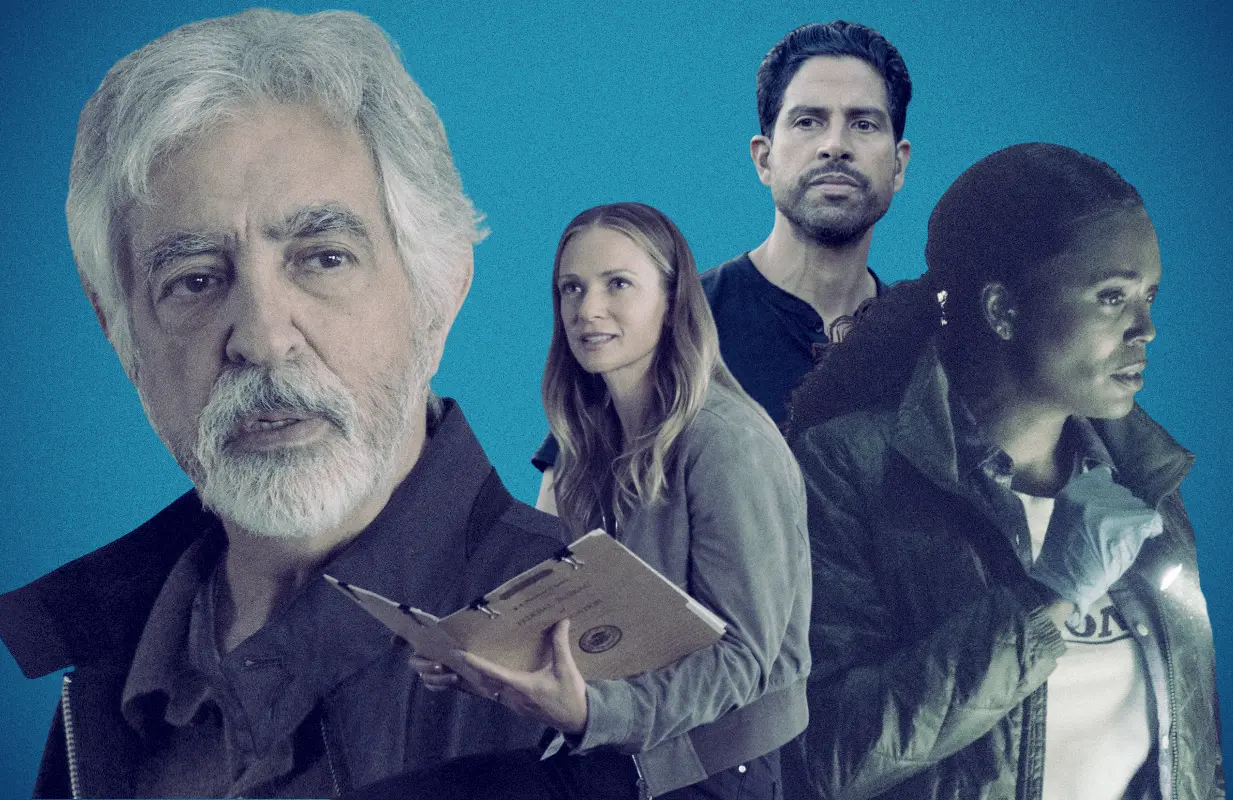Where's the Evolution in Paramount's Criminal Minds Sequel?
-
 Joe Mantegna, A.J. Cook, Adam Rodriguez, and Aisha Tyler in Criminal Minds: Evolution. (Photos: Paramount+/Illustration: Primetimer)
Joe Mantegna, A.J. Cook, Adam Rodriguez, and Aisha Tyler in Criminal Minds: Evolution. (Photos: Paramount+/Illustration: Primetimer)Despite its subtitle, Criminal Minds: Evolution hardly feels like anything of the sort. Released nearly three years after Criminal Minds ended its 15-season run on CBS, the Paramount+ sequel series has been pitched as a progression for the franchise, with taglines like “Times have changed” and “This is just the beginning” teasing the promise of something new.
In some respects, Evolution does offer something different than its parent series. The move to streaming allows the writers to ditch broadcast’s 42-minute format, and the show uses that extra 10 minutes (the first two episodes run 51 and 54 minutes, respectively) to flesh out the characters’ home lives. Evolution also incorporates a serialized story, which plays out alongside the franchise’s typical case-of-the-week format, that sees the members of the FBI’s Behavioral Analysis Unit investigate a network of serial killers operating under the auspices of one prolific murderer, Elias Voit (Zach Gilford, Friday Night Lights). Joe Mantegna’s David Rossi even gets to drop a single F-bomb, a shift in language that doesn’t go unnoticed by Agents Alvez (Adam Rodriguez) and Jareau (A.J. Cook).
By and large, though, these so-called "evolutions" just feel like an excuse to get the band back together so they can play their greatest hits. After leaving the BAU in the Criminal Minds series finale, technical analyst Penelope (Kirsten Vangsness) is quickly sucked back into the team’s serial killer-hunting efforts, and her legitimate concerns about the job’s negative impact on her mental health are waved away.
Rossi begins Evolution consumed with grief over the death of his wife Krystall (played by Gail O’Grady in the original series), which occurred sometime in the interim between the two shows. The team makes repeated references to her death in the first two episodes — and the premiere hinges on a moment of extreme vulnerability from Rossi — but the drama is purposely evasive about what happened, which makes for a frustrating viewing experience for fans eager to see this group of criminal profilers move forward.
With so much time spent looking backwards, the novelty of Criminal Minds: Evolution rests in its serial killer storyline. But while the show may be the first to supercharge a serial killer plot by introducing a dozen different UnSubs, it contributes little else new to a genre that’s been whipped into a frenzy in recent years.
Thankfully, not every macabre act plays out on-screen (one gets the sense that the old CBS guardrails are still up, to a certain extent), but when the sequel chooses to depict violence, it commits: The second episode includes a graphic scene of a man cutting into a victim’s skin and severing his spinal cord, killing him instantly. The smaller cases that dominate the first two episodes also fall back on tropes of sexual dissatisfaction and self-loathing, a common theme among the many true-crime documentaries and scripted series on streaming, particularly Ryan Murphy’s Dahmer — Monster: The Jeffrey Dahmer Story.
In a world where new serial killer shows seem to drop every week, Evolution feels like a perfunctory take on the subject matter. This, combined with its overtly nostalgic point of view, makes the show’s claims of an “evolution” seem even more meaningless. It’s hardly a progression if a series rehashes things we’ve already seen, not just from its parent show, but from the genre as a whole.
Criminal Minds: Evolution premieres November 24 with two episodes on Paramount+.
People are talking about Criminal Minds: Evolution in our forums. Join the conversation.
Claire Spellberg Lustig is the Senior Editor at Primetimer and a scholar of The View. Follow her on Twitter at @c_spellberg.
TOPICS: Criminal Minds: Evolution, Paramount+, Adam Rodriguez, Aisha Tyler, A.J. Cook, Joe Mantegna, Kirsten Vangsness, Paget Brewster, Zach Gilford